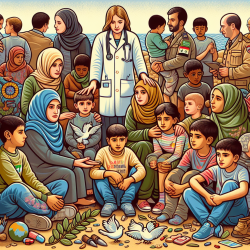The Syrian refugee crisis has resulted in millions of displaced individuals, with children constituting a significant portion of this population. These young refugees face numerous challenges that increase their risk for adverse mental health outcomes, including suicidality. A recent study titled "Suicidality Among Syrian Refugee Children in Jordan" provides critical insights into the prevalence and predictors of suicidal thoughts among this vulnerable group. This blog aims to help practitioners improve their skills by implementing the research findings or encouraging further exploration.
The Study: Key Findings
The study surveyed 339 Syrian refugee children aged 10 to 17 years and their parents living in Jordan. It aimed to assess resilience, depression, and suicidality among these children. The results were alarming, with 27.7% of the children reporting suicidal statements. Younger children were more likely to express suicidal ideation than older ones. The study identified several predictors of suicidality:
- Depression: Both mild and high levels of depression were strongly associated with suicidality.
- Bullying: Children who experienced bullying were more likely to report suicidal thoughts.
The study highlights the need for targeted interventions to address these issues within refugee populations.
Implementing Research Outcomes
Practitioners working with refugee children can enhance their support strategies by incorporating the study's findings. Here are some recommendations:
1. Early Detection and Intervention
Practitioners should prioritize early detection of depression and bullying among refugee children. Regular screenings using validated tools like the Children's Depression Inventory (CDI-2) can help identify at-risk individuals early on.
2. Creating Safe Spaces
Schools and community centers should be equipped to provide safe environments where children feel secure and supported. Anti-bullying programs and peer support groups can be effective in reducing bullying-related stress.
3. Parental Involvement
The role of parents is crucial in addressing child suicidality. Educating parents about the signs of depression and suicidality can empower them to seek timely help for their children.
4. Culturally Sensitive Interventions
Cultural sensitivity is essential when designing interventions for refugee populations. Programs should consider cultural norms and stigmas surrounding mental health to ensure effectiveness and acceptance.
The Need for Further Research
The study underscores the complexity of suicidality among refugee children and highlights areas for further research:
- Diverse Populations: More studies are needed across different refugee groups to understand cultural variations in mental health outcomes.
- Pediatric Assessments: Developing age-appropriate assessment tools that consider the unique experiences of refugee children is vital.
A Call to Action
The findings from the study on Syrian refugee children serve as a call to action for practitioners, educators, and policymakers. By implementing evidence-based strategies and fostering a collaborative approach, we can better support these vulnerable children and mitigate the risk of suicidality.
Read the original research paper: Suicidality Among Syrian Refugee Children in Jordan










